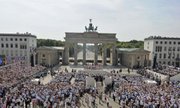A familiar proposition will appear Tuesday on Jefferson City ballots.
For the seventh time, city voters will be asked to renew the half-cent capital improvement sales tax, which will be on Tuesday's ballot as Proposition 1 and is expected to generate $25 million over five years. The city's sales tax is in its sixth five-year installment since starting in 1987 and typically is used to fund what are seen as one-time purchases or large projects and equipment.
The Jefferson City Council approved a resolution in April outlining the allocations for the next sales tax, if approved by voters. The approved allocations are largely unchanged from the current installment, with public works receiving 59 percent, or $14.75 million; public safety receiving roughly 19 percent, or $5 million; parks receiving 10 percent, or $2.5 million; IT/GIS receiving 2 percent, or $500,000; and contingency funds making up another 9 percent, or $2.25 million.
Linda McAnany, Bill Plank and former Mayor John Landwehr have been spearheading the renewal effort as the sales tax campaign co-chairs, visiting civic groups and organizations to explain the tax and urge people to vote in favor. In its talks, the group has emphasized the proposition is a renewal and not a new tax.
"We've had the privilege of enjoying the funds from this renewal for 30 years," McAnany said. "I'm amazed as I look around the community at all the projects that have taken place in that time. A good portion of those have been made possible by this sales tax."
Plank said the allocations help identify what funds will be spent on while also leaving room for emerging projects, which can be funded through the contingency amount of $2.25 million.
"We can't forecast exactly what's going to happen in the next five years," Plank said. "We do have some money in there for other things that might come up."
The city typically proposes the percent allocations as a somewhat flexible spending plan for the sales tax funds in order to give voters an idea of what their money will fund, while giving the city itself more leeway in spending. When the sales tax began in 1987, it was far more specific, but officials learned through sales taxes A and B the specific proposals often tie their hands when circumstances change.
Sales Tax A was marketed to voters with a specific plan for improvements to the Missouri Boulevard and Dix Road intersection, which turned out to not be as critical as previously thought after the tax had passed, but the city was locked in. And Sales Tax B promised voters a portion would be used in building up Adrian's Island, making it accessible and improved with trails and other natural recreation features. While there is currently a proposal for Adrian's Island that could use those funds, that money has been unable to be spent on anything else after the tax passed in the early 1990s.
But with the more flexible spending plan, the city also often highlights one larger planned project, and for Sales Tax G, that would be Fire Station No. 2 on East McCarty Street.
Built in 1970, the fire station is the second oldest in the city now that Fire Station No. 3 has been replaced. Fire Station No. 4, on Ellis Boulevard, is the oldest, being built in 1969.
According to a facility review done in 2011, station No. 2 had a lack of office space, inadequate equipment and gear storage, inadequate restroom and shower facilities, no workout room, too small of a kitchen, a need for a larger meeting room, a need for a better vehicle exhaust system, inadequate apparatus space, no bunks or restrooms for female firefighters, and a need for a clean room and storage area for emergency medical services.
The review stated "while additions and renovations can be made to upgrade it, the cost for those should be weighed against the current age and overall value of the building in comparison to replacing the building."
Landwehr said the tax does not fund salaries or personnel and is a critical portion of the city's budget, noting capital projects are not completed from the general revenue budget.
"There's nothing in the city budget for capital improvements, for big items," Landwehr said. "This is our capital improvement budget. Without this, we don't do capital improvements. We stop. So it's critical."
No organized opposition to the sales tax came out during the campaign.
Additional election coverage:
Cole County clerk predicts 30 percent voter turnout
Cole County sheriff candidates discuss crime
Two Republicans vying for 3rd Congressional District seat
Democratic newcomers running for 4th Congressional District


